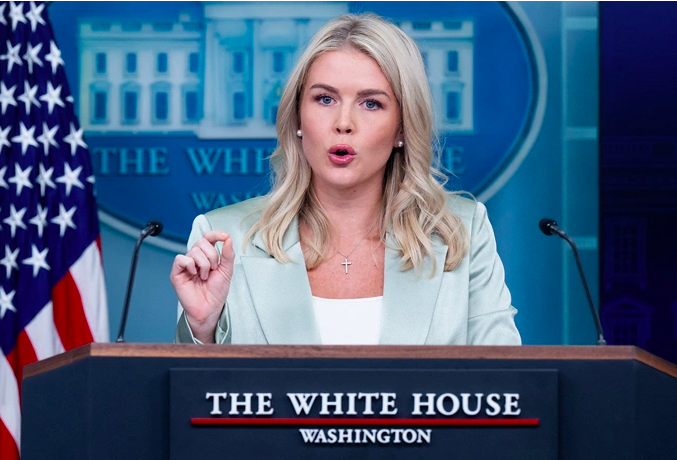Karoline Leavitt Dismisses ‘Christian Nationalism’ Concerns Amid Trump’s Prayer Push
White House Press Secretary Karoline Leavitt forcefully rejected accusations that President Donald Trump’s new national prayer initiative amounts to “Christian nationalism,” framing the effort as a unifying call for faith, gratitude, and moral renewal in America.
The controversy arose after President Trump announced the launch of America Prays, a campaign connected to the upcoming America 250 celebrations, encouraging citizens to turn to prayer as the nation approaches its semiquincentennial. Trump described prayer as the foundation of the nation’s moral compass, pointing to America’s long history of public acknowledgments of faith.
Critics, particularly in left-leaning media outlets, immediately charged that Trump’s language blurred the line between church and state. Some progressives labeled the initiative as an endorsement of “Christian nationalism,” a phrase increasingly used by secular groups to discredit Christians who want faith to influence public life.
Leavitt, however, was clear in her dismissal of the charge. “Calling people to prayer is not extreme, it is not divisive, and it is certainly not dangerous,” she said during a press briefing. “President Trump is standing in the tradition of George Washington, Abraham Lincoln, Ronald Reagan, and countless leaders who have called upon God’s blessing for our nation.”
She further criticized the media for what she described as a deliberate mischaracterization. “When Democrats invoke God or quote Scripture, the press applauds them as inspirational. When President Trump and conservative Christians do the same, suddenly it is portrayed as a threat to democracy. That double standard is both obvious and hypocritical.”
The official America Prays website, hosted on WhiteHouse.gov, outlines a series of prayer gatherings, digital resources, and opportunities for Americans to join together in prayer leading up to July 4, 2026. The initiative describes prayer as “a sacred tradition that has carried America through wars, depressions, and cultural divisions.” The campaign highlights moments such as Lincoln’s call for national prayer during the Civil War and President Franklin D. Roosevelt’s radio-led prayer on D-Day.
Supporters say this emphasis on prayer is long overdue in a country that has increasingly pushed faith out of the public square. Conservative leaders and faith organizations have praised the Trump administration for openly acknowledging God’s role in American history. They argue that far from promoting extremism, the initiative reflects mainstream values embraced by most Americans for centuries.
Some media outlets, however, painted the campaign in ominous tones. A recent Washington Post piece warned of “church-state entanglement,” suggesting Trump was using religion to solidify his political base. Progressive critics claimed the initiative could alienate non-Christians. Yet, the program’s language is not denominational—it simply invites all Americans to pray for the nation’s future.
Leavitt underscored this point in her response. “This is not about one denomination, nor is it about imposing religion. It is about acknowledging what the majority of Americans already believe—that faith, prayer, and God’s blessing are essential to our survival as a nation.”
From a conservative Christian perspective, accusations of “Christian nationalism” reveal more about the left’s hostility toward faith than about Trump’s actual agenda. For decades, secular activists have sought to erase religious influence from public life, despite the First Amendment’s guarantee of free exercise. Many argue that branding ordinary prayer as “nationalism” is simply the latest attempt to stigmatize Christianity.
The President’s initiative also arrives at a time of moral and cultural uncertainty. Rising crime, family breakdown, and widespread cultural confusion have left many Americans searching for direction. Trump and his allies believe prayer can serve as both a stabilizing force and a moral anchor. By calling on God’s guidance, they hope to inspire a cultural reset rooted in timeless values rather than ideological experimentation.
Leavitt’s defense of the program signals the administration’s intent to stand firm against critics who weaponize the “Christian nationalism” label. She emphasized that the left’s campaign against prayer reveals their fear of faith’s enduring power. “When Americans turn to God, they are less dependent on big government. That’s what really threatens progressives,” she argued.
For many Christians, the White House’s unapologetic stance is refreshing. Unlike previous Republican administrations that often downplayed overt religious references for fear of media backlash, Trump’s team is leaning in. Their message is simple: America’s spiritual foundation is not something to be ashamed of, but something to reclaim.
While debate over the role of faith in public life is hardly new, the reaction to America Prays illustrates the widening gap between secular progressives and conservative Christians. To one side, prayer is portrayed as an exclusionary tool of political power. To the other, it is a lifeline to God and the only hope for a fractured nation.
What remains clear is that Leavitt and the Trump administration have no intention of retreating. With the 2026 milestone approaching, they see prayer not as a relic of the past, but as the most vital force for America’s future.


